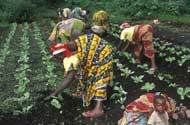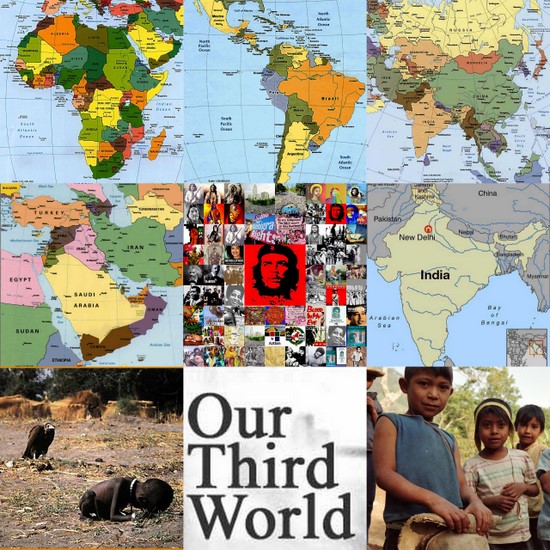

Picture: Agriculture supports 70% of the DR Congo's population of 60 million. Credit: FAO.
>>>>>>>>>>>>>>>>
Tuesday, September 23, 2008
We have often referred to the agricultural potential of the world's poorest country, the Democratic Republic of Congo (DRC). The tragic contradiction is that this nation has the highest rate of undernourished and hungry people on the planet (70% of all Congolese), while at the same time it has the natural resources to become a major world food producer and exporter. In an interview with Reuters, the director of the International Food Policy Research Institute (IFPRI), Dr Joachim Von Braun, repeated how depressing this contradiction is, but he also offered some recipes for hope.
The giant Central African country has around 80 million hectares of non-forest land available for agriculture and could become a bread basket for the developing world, with some projections showing that it should be able to produce food for 3 billion people with optimal land use strategies. But decades of mismanagement, corruption, war and state collapse have kept out investors who need to pull this off.
The Congo River and its huge web of tributaries offer ample water for irrigation. The varied climate provides ideal conditions for a large number of crops.
The potential of Congo is huge. It could be another Brazil. If this plot of land were elsewhere in the world it could truly feed large amounts of the developing world. - Joachim von Braun, director general, International Food Policy Research Institute
But today, like much of Africa, Congo can't even feed itself. More than 70 percent of Congolese are affected by hunger and food insecurity, according to the U.N.'s Food and Agriculture Organisation. Infant malnutrition is on the rise.
Von Braun is clear: "You cannot eat potential". Instead, potential needs to be tapped by investment, and that investment in agriculture and rural infrastructure requires a lot of capital, a lot of long-term attention by government and the private sector.
The former Belgian colony is recovering from a devastating 1998-2003 war that killed an estimated 5.4 million people.
Eighty percent of land that could be farmed is either unused or under utilised, von Braun said. What farming exists is almost entirely subsistence agriculture. And amongst subsistence-economies, Congo performs worst. Yields for most crops are four to five times below what they could be with modest interventions.
A lack of roads to bring produce to market in Congo's urban centres mean much of what is consumed in cities is imported. A potential huge food exporter is a huge importer. As a result, Congo has been one of the countries worst hit by rising food prices linked to high oil and transport costs.
Agricultural investments = peace
Though much of this catastrophic state of affairs can be blamed on war and the limitations of a shattered economy, von Braun said the government's failure to prioritise farming has also stunted growth in the sector.
While 70 percent of Congolese earn a living in the sector, which makes up nearly half of Congo's economy, only 1 to 2 percent of state spending goes to investment in farming:
energy :: sustainability :: biomass :: bioenergy :: biofuels :: agriculture :: food :: poverty :: Congo ::
The investments in agriculture are investments in peace in this big country, but they need to be initiated now. Any waiting longer will undermine the economic growth.
He warned against investing heavily in industrial farming or the large-scale agriculture of Congo's colonial past. Instead he urged support for small farmers and for improving farming methods and equipment through microfinance programs.
Congo also needs to build roads so farmers can sell their crops to consumers, reducing imports to create a self-sustaining domestic sector that should one day be able to export, he said.
The gap couldn't be wider. This is the country where these two, reality and potential, are divided the widest of any significant large country. So you may call this depressing, or it can also be looked upon as a great opportunity. - Von Braun
Von Braun's words came after his participation in a workshop in Kinshasa, organised by the Congolese Ministry of Agriculture, at which one of the leading agricultural economists, Professor Eric Tollens of the Catholic University of Leuven, spoke too.
Prof. Tollens largely agrees with Von Braun's assessment. A critical problem is the lack of transportation infrastructures in Congo, which make it difficult for farmers to get their products to large cities, such as Kinshasa and Lubumbashi. High oil prices add to the troubles. The result is a growing dependence on imported food, which becomes ever more expensive.
But this trend offers an opportunity for Congolese farmers. Producing locally is becoming attractive, even with all the hurdles that scare off investors.
Tollens urges the Congolese government to pour much more money into the agricultural sector, because the rewards are so huge. Currently, this sector relies on handouts by the international donor community (see the recent overview by the FAO: Relaunching agriculture in war-torn DR Congo, one field at a time). But farming could be the biggest and most cost-effective engine for social and economic progress in the country and the region. If the state invests more in agriculture, it will create an environment of trust needed by foreign investors who want to enter the country's farming sector.
References:
Reuters: Hungry Congo could help feed the world: expert - September 18, 2008.
MediaCongo: RD Congo : L'affamé qui pourrait aider à nourrir le monde - September 22, 2008.
CongoForum: Congo: 70 procent bevolking is ondervoed - September 19, 2008.
FAO: Relaunching agriculture in war-torn DR Congo, one field at a time - September 2008.
Biopact: DR Congo debates its enormous biofuels potential - June 05, 2008
Biopact: UN's FAO: bright future for sustainable biofuels DR Congo - January 08, 2008
http://news.mongabay.com/bioenergy/2008/09/ifpri-hungry-congo-can-become-bread.html
http://en.wikipedia.org/wiki/Democratic_Republic_of_the_Congo
+++++++++++++++++++++++++
3rd-World-News Blog ~
http://third-world-news.blogspot.com
+++++++++++++++++++++++++


No comments:
Post a Comment